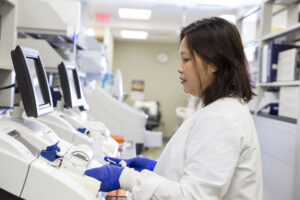If so, you may want to consider genetic evaluation and testing
 Most people develop cancer by chance or due to risk factors that happen over a lifetime. However, some people develop cancer due to a hereditary cancer syndrome. A hereditary cancer syndrome is an inherited increased chance (higher than the general population) to develop certain types of cancer due to a change (mutation) in a gene that normally keeps cells healthy. Inherited conditions are passed from generation to generation and can come from the mother’s or father’s side of the family. Approximately 5 % of people diagnosed with colorectal cancer develop their cancers due to a hereditary cancer syndrome.
Most people develop cancer by chance or due to risk factors that happen over a lifetime. However, some people develop cancer due to a hereditary cancer syndrome. A hereditary cancer syndrome is an inherited increased chance (higher than the general population) to develop certain types of cancer due to a change (mutation) in a gene that normally keeps cells healthy. Inherited conditions are passed from generation to generation and can come from the mother’s or father’s side of the family. Approximately 5 % of people diagnosed with colorectal cancer develop their cancers due to a hereditary cancer syndrome.
The most common hereditary colorectal cancer syndrome, Lynch syndrome, is caused by a hereditary mutation in any one of the following genes: MLH1, MSH2, MSH6, PMS2 or EPCAM. A person with Lynch syndrome has an increased chance of developing colorectal, uterine, ovarian, stomach, pancreatic, small bowel, bladder/ureter/kidney and some other types of cancer. However, there are a number of other genes associated with hereditary colorectal cancer / polyps, including but not limited to: APC, ATM, AXIN2, BMPR1A, CHEK2, CDH1, GREM1, NTHL1, POLE, POLD1, PTEN, SMAD4, STK11, TP53. This list keeps growing as researchers keep finding more genes to include.
Genetic evaluation and testing is available to help identify families with a hereditary cancer syndrome. Knowing that there is a hereditary cancer syndrome in the family can help healthcare providers make appropriate recommendations for a person’s cancer risk management (increased screening and/or ways to lower risk) and possibly also a person’s cancer treatment. Examples of people who should consider genetic evaluation and testing for hereditary colorectal cancer include but are not limited to:
- Those who were diagnosed with colorectal cancer and at least one of the following:
- and were diagnosed under age 50 years
- and were diagnosed with another separate Lynch syndrome cancer
- and have a close blood relative diagnosed with a Lynch syndrome cancer under age 50 years
- and have several close blood relatives with Lynch syndrome cancers
- Those who have a history of at least 10 colon polyps (known as tubular adenomas) removed during their lifetime
- Those who have at least one close blood relative meeting the above criteria
- Those who have several close blood relatives with colon cancers / polyps and/or other Lynch syndrome cancers on the same side of the family
- Those who have a family history of a known hereditary cancer syndrome that includes or may include increased risk for colorectal cancer / polyps
People who already went through genetic evaluation and testing years ago (typically in 2016 or earlier) for only a few of these genes and tested negative for a mutation may consider the option of being tested for more hereditary colorectal cancer genes in the future.
Please discuss your personal and/or family history of cancer with your healthcare providers if you think you may benefit from genetic evaluation and testing for hereditary colorectal cancer. Your healthcare provider may decide to refer you for genetic evaluation and discussion of your current genetic testing options. Health insurance companies may cover most if not all of the cost of genetic testing on a case-by-case basis.
If you are interested in learning more about the William G. Rohrer Cancer Genetics Program at MD Anderson Cancer Center at Cooper or would like to schedule an appointment, please call 855.MDA.COOPER and ask to speak with the Cancer Genetics Program Administrative Coordinator. Our William G. Rohrer Cancer Genetics Program Genetic Counselors are Molly Kalasinski, MS, LCGC, Brooke Levin, MS, LCGC, Kristin Mattie, MS, LCGC, Vanessa D. Manso, MS, LCGC, Caitlin O’Brien, MS, LCGC, and Kathryn Zarnawski, MGC, LCGC.
